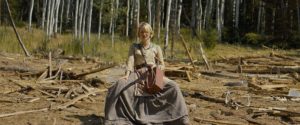Click here for the flashback interview with Robert Pattinson for TWILIGHT.
Click here for the flashback interview with Mia Wasikowska for JANE EYRE.
It would be best to approach DAMSEL with an open mind, the better to let its piquant originality wash over you. This fiercely iconoclastic western uses many tropes from that cinematic genre, from the classics of John Ford to the more recent idioms of Sergio Leone, but the references are merely window dressing. Part comedy, part tragedy, part feminist manifesto, and all engrossing, it subverts expectations at every turn while delivering a film that refuses to be pigeonholed.
It begins with a vignette that serves as intro and, later as a punch line as Robert Forster’s grizzled preacher strikes up a conversation with the only other person waiting for a stage in the middle of nowhere. They are at a metaphorical crossroads there among the tumbleweeds and majestic rock formations, as the preacher impatiently waits for a stage that has no signs of appearing (how like waiting for Godot). He is going back east, having had it with the west, while the young man is heading the other way, in order to start his life over again after a bad run of luck. The preacher, choosing truth, or at least the truth of his life’s experience, over platitudes tells the young man that there is nothing new in the west, just the same old crap in new a fascinating ways. His reaction to the young man’s reply to that is wonderfully absurd and enigmatic. That done, the rest of the story begins.

Robert Pattinson
In it, Samuel Alabaster (Robert Pattinson) earnestly treks the wilds of the west in search of his one true love, Penelope (Mia Wasikowska). His quest is to free her from her captors, fall to his knees while asking for her hand in marriage, and then provide the nuptials on the spot. Hence, he’s not alone. Planning ahead, he’s enlisted Parson Henry (co-writer/co-director David Zellner) a melancholy preacher of dubious reputation, and a miniature horse named Butterscotch, because Penelope has always hankered for one. Pattinson’s goofy innocence, clad in an ersatz Eagle Scout ensemble, has the nobility of a holy fool about it, deflecting the ennui and casual violence of the townsfolk he encounters, and charming the viewer with the purity of his mission. As for the Parson, he’s in it for the money, and any liquor that he can find.

Mia Wasikowska
The question floats to mind about how any mortal woman can be worthy of such dedication, but Penelope, when we finally meet her, puts any doubts to rest. Far from the usual damsels suffering from distress in folk and fairy tales, she is capable woman with her own plans, and from which it would not occur to her to be deterred. She has a deeply philosophical set of ethics, and all the more dangerous because of that. Wasikowsaka makes her tough, but not hard, and with her cropped hair and resolute squint, she redefines femininity both in the 19th-century and in ours.
Zellner and his brother, Nathan, who plays an iron man of a backwoodsman, have people their story with curious characters, from a laughing man wearing only a barrel over his long johns, to a soft-spoken, quick acting Native American (Joseph Billingiere) to whom Parson Henry takes an ambiguous shine. The vast landscapes and cramped interiors become a showcase for human folly in its search for love, and the lengths on will go to secure it. Nothing is ever what it seems as layers are peeled back, and the surprises that punctuate the action make the lopsided sense that this surreal world demands.
DAMSEL’s most ironic turn is its precise and deliberate lack of sentiment. Never played for laughs, it has the clinician’s eye to its jester’s sensibility as it cleanly dissects that ci-mentioned folly, leaving it for us to decide who deserves our pity and who our scorn.
Your Thoughts?